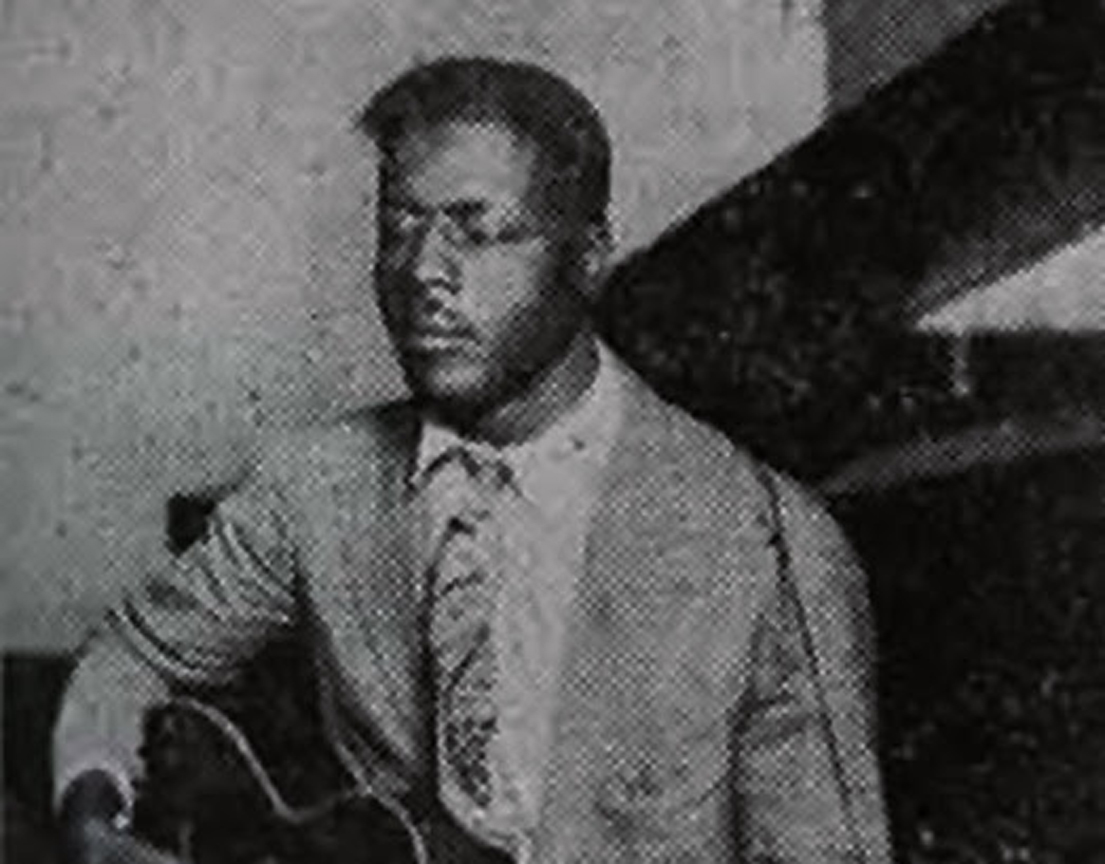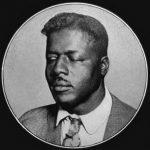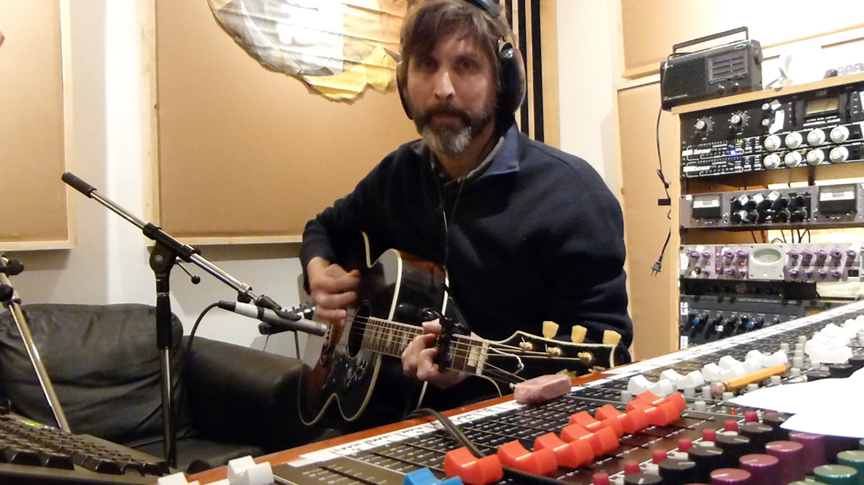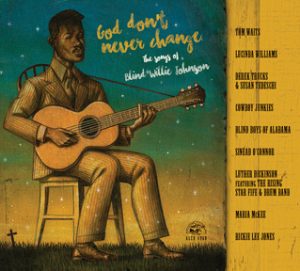By j. poet
Once you hear the voice of Blind Willie Johnson, you’ll never forget it. His stentorian growl is the essence of soul; every blues vocalist from Howlin’ Wolf to Van Morrison owes a debt to his righteous singing style. Instrumentally, his unique slide guitar has influenced everyone from Robert Johnson to Jack White and Derek Trucks.
Johnson, born in Pendleton, Texas in 1897, only recorded 30 songs during his brief studio career, but every one is a timeless gem. You may not know his name, but you’ve heard his “hits” performed by Bob Dylan (“In My Time of Dyin’”); Peter, Paul and Mary (“If I Had My Way”); Led Zeppelin (“Nobody’s Fault But Mine”) and Eric Clapton (“Motherless Children”). Johnson’s 78s made him a successful artist in the late ’20s, selling an average of 15,000 each. He had a car and a driver to take him to his early sessions, but after the Great Depression, he never recorded again. (Johnson died at age 48 in 1945.)
Johnson played in a bluesy style, but his music was sacred, based as much on African American gospel traditions as it was on the blues. His bone-rattling baritone delivered messages of salvation and perdition that are still relevant today.
“Johnson plays what I call primitive modernism,” says Luther Dickinson, leader of the Mississippi All Stars and sometime lead guitarist for the Black Crowes. “He’s the earliest blues drone guitar player. His one-chord songs are harmonically primitive, but they still sound modern. [Johnson’s song] ‘Dark Was the Night’ is the spaciest blues song ever, the cornerstone of every blues song since. The records he made before the Depression are part of a brief explosion that changed American music forever. They set the stage for early rock ’n’ roll.”
Dickinson is one of the artists featured on God Don’t Never Change: The Songs Of Blind Willie Johnson, a tribute album produced by Jeffrey Gaskill, who also helmed the Grammy-nominated compilation, Gotta Serve Somebody: The Gospel Songs of Bob Dylan. (The new album, out Feb. 26 on Alligator Records, features liner notes by regular Lone Star Music contributor Michael Corcoran.)
Gaskill says hearing Johnson’s music in 2002 was an inspiration.
“A friend told me I should check out Johnson, a gospel musician that played in a blues style,” Gaskill recalls. “I knew most of his songs from versions by other artists, but I didn’t know he wrote them. I was impressed by his musicianship, his style and his point of view. There were similarities with Dylan’s gospel period. It’s a finite body of work with a timeless message. It’s not entertainment. It’s not art for art’s sake. It has lasting nutritional value.”
Gaskill wondered how a man who had written songs known by almost every blues and folk musician could still be relatively unknown. He began traveling through Texas, investigating Johnson’s life. Even though the record business was imploding, he felt a need to introduce Johnson’s to today’s listeners. “I’m not sure when it went from an idea to a project I knew I had to do, but you gotta serve somebody,” he says. “I decided to serve the songs of Blind Willie Johnson.”
The album took shape in Gaskill’s mind in 2008. After consulting with artists and labels, he started raising funds to make the album with a Kickstarter appeal in 2013. “I raised the money in 30 days, but a lot of prep went into it before the campaign.”
God Don’t Never Change includes recordings by Tom Waits, Lucinda Williams, Derek Trucks and Susan Tedeschi, Cowboy Junkies, the Blind Boys Of Alabama, Sinéad O’Connor, Luther Dickinson, Maria McKee, and Rickie Lee Jones. “I picked songs that I thought each artist would relate to,” Gaskill says. “Everybody had some kind of connection to the early blues or had mentioned as much in an interview, something that suggested they had a sense of history, that they were maintainers of this roots music tradition.”
“I discovered Blind Willie in the ’80s, when I was working in a record shop in London,” says Michael Timmins of Cowboy Junkies. “His singing is amazing. Then you pick up on his slide guitar playing and realize how radical it is. It’s like something from a different world and it was done 100 years ago.” Timmins and his band helped Gaskill make a few promo videos for the Kickstarter project. They contribute a fierce performance of “Jesus Is Coming Soon” to the album.
“Jeff (Gaskill) suggested that song,” Timmins says. “It’s not one we were drawn to, but we took it as a challenge. I’m not a great slide player, but Johnson had other distinctive techniques, including a pounding rhythm guitar style. We started working around a sample of Johnson singing the chorus, building the arrangement around his vocals. We were going to take him out (of the finished arrangement), but it made such a big difference in the energy of the song every time he came around in the chorus, we decided to keep it in. He sings harmonies with Margot (Timmins, the band’s lead singer) from beyond the grave. If somebody comes to this record not knowing his music, and they hear his strange growl, it may inspire them to go search out his original recordings.”
Gaskill also hopes that the album will introduce Johnson to people who are only familiar with his songs by the work of other artists. He said he could have asked people to cover more familiar songs, but wanted to introduce listeners to the wide range of Johnson’s songwriting. “I chose songs people weren’t so familiar with, so the record can have a beginning, a middle and an end,” the producer explains. “I chose ‘Jesus Is Coming Soon,’ a song about the 1918 flu epidemic, because it’s a great topical song and, unfortunately, it’s relevant to today.”
On another timeless note, Johnson’s recording of “Dark Was the Night, Cold Was the Ground” was included on the gold disc that was sent into intergalactic space on the Voyager 1 space probe in 1977. Dickinson finds the very thought of this exciting.
“When white kids found Willie’s records in the ’50s and ’60s, they said, ‘Oh my God! What is this?’” he marvels. “When intelligent life finds that satellite and plays ‘Dark Was the Night,’ they’re going to have the same reaction.”










No Comment